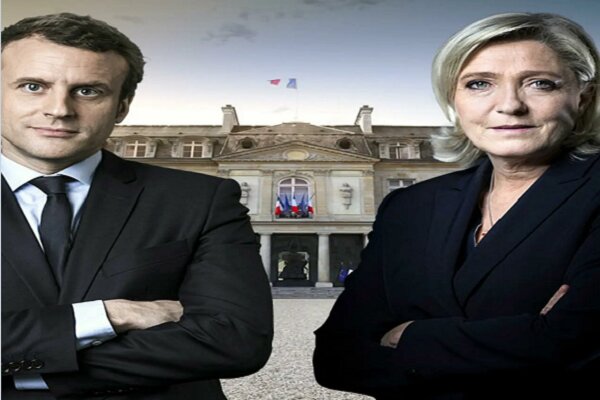French President Emmanuel Macron tore into his far-right challenger Marine Le Pen about her links with Russia and her plan to ban Muslim women from wearing the hijab in public in a fractious television debate ahead of Sunday’s second and final vote for the presidency, AlJazeera reported.
The only head-to-head confrontation of the second round campaign was peppered with appeals of “don’t interrupt me” and accusations the other was not up to the job of leading France, a veto-holding UN Security Council member and Europe’s second-largest economy.
Polls suggest that Macron, a pro-European centrist, has a growing and significant lead over Le Pen. But the result is expected to be closer than five years ago, and both candidates are angling for votes among electors who did not support them in the election’s first round on April 10.
Macron hammered away at his rival over a 9 million euro ($9.8 million) loan that Le Pen’s party received in 2014 from a Czech-Russian bank, saying it made her unsuitable to deal with Moscow.
Macron also said her plan to ban Muslim women in France from wearing headscarves in public would trigger “civil war” in a country that has the largest Muslim population in western Europe.
Le Pen bristled at Macron’s suggestion that she was beholden to Russia. She described herself as “totally free” and said Macron “knows full well that what he says is false”.
She sought to appeal to voters struggling with surging prices amid the Ukraine war. She said bringing down the cost of living would be her priority if elected as France’s first woman president and sought to portray herself as the candidate for voters unable to make ends meet.
She said Macron’s presidency had left the country deeply divided. She repeatedly referenced the so-called “yellow vest” protest movement that rocked his government before the COVID-19 pandemic, with months of violent demonstrations against his economic policies.
Just 14 percent of voters were waiting for the debate to decide who to vote for, while 12 percent said it would be decisive for whether they will vote at all, a poll by OpinionWay-Kea Partners for Les Echos newspaper showed.
That said, after more than half of the electorate voted for far-right or hard-left candidates in the first round on April 10, Macron’s lead in opinion polls is much narrower than the last election when he beat Le Pen with 66.1 percent of the vote.
Since then, Le Pen has at least partly succeeded in attracting mainstream voters while Macron is no longer the same outside disruptor that he was in 2017 when the debate cemented his status as the clear frontrunner.
ZZ/PR

























Your Comment